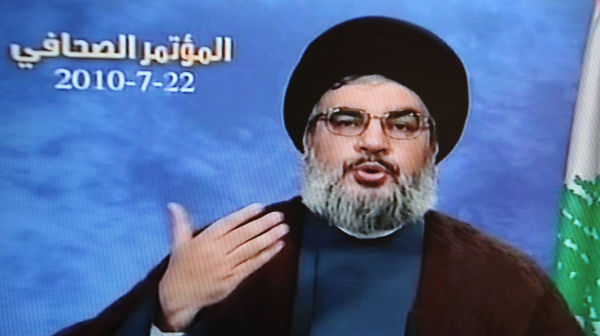Nasrallah: ‘reasons for worry’ about Israel clash
Hezbollah’s leader says he doesn’t expect conflict to follow Lebanon’s dispute with Israel, but four years since the war was at its height, his comments spark concern between the two countries.

The head of Lebanon’s Hezbollah group, Sayyed Hassan Nasrallah’s comments followed Tuesday’s border dispute between Israeli Defence Forces (IDF) and the Lebanese Army which left five dead.
Four years after the war between Israel and Hezbollah was at its height, the fighting, which took place after the Israeli army undertook a tree pruning operation on the sensitive border area, underlined the speed with which tensions could re-ignite along the frontier.
Tuesday’s deaths were the first on either side since the 2006 war in which 1,200 people – mostly civilians – were killed in Lebanon, along with 158 Israelis, mostly soldiers.
In 2006 the IDF bombed bridges, fuel tanks, radar stations and Beirut airport, while Hezbollah fired 4,000 rockets into Israel. Israel has threatened to attack Lebanese infrastructure in any new conflict.
With Nasrallah’s comments suggesting mounting tensions, Channel 4 News looks at the positions of the key forces arrayed against each other.
Kylie Morris reporting from the war in July 2006
Four years ago Channel 4 News correspondent Kylie Morris travelled across Lebanon to report the scale of destruction wrought by Israeli airstrikes on civilian life infrastructure.
On 30 July 2006 she reported from the village of Qana, eight miles north of the border, where more than 60 people were killed, including 37 children. The strike took place without warning at 1.30 am.
The following day the team set out from Tyre, through a string of villages to Bint Jbeil, where Hezbollah guerrillas fought hand-to hand battles with Israeli forces - a land deserted and ravaged by war.
Hezbollah
Sayyed Hassan Nasrallah, leader of Iranian- and Syrian-backed Hezbollah, said he did not think Tuesday’s clashes would lead to a bigger conflict but said “there are reasons for worry”.
The pro-Iranian Lebanese Hezbollah movement waged war with Israel in 2006. The head of Lebanon’s Hezbollah group, which stayed out of Tuesday’s fighting, said it would act if Israel attacked the Lebanese Army.
Given that Lebanese forces say there is still intermittent gunfire along the border, there is mounting concern that Hezbollah may once again engage in conflict with the IDF.
Lebanese army
The Lebanese Army has admitted to firing first in the conflict which left two of their own soldiers killed and others seriously wounded. According to a security source in Lebanon, “the Lebanese army fired warning shots” at the Israelis who were pruning the disputed tree, and the Israelis “responded by shelling”.
Lebanese Prime Minister Saad al-Hariri has denounced what he calls “the Israeli violations of Lebanese sovereignty”. His office said that he has been in contact with Egyptian President Hosni Mubarak to discuss “ways to confront the Israeli aggression against the Lebanese army”.
Israeli Defence Force
Tensions are high today, as defence minister Ehud Barak told Israel Radio that the IDF would continue to operate its tree-pruning operation and said: “It will not be legitimate if they try to disrupt today, and we will have to respond.”
In Jerusalem, Netanyahu convened his security cabinet and also said Israel would “respond aggressively” to any future attempt “to disrupt the calm along the northern border”.
Given that Hezbollah has also given clear indication that should Lebanese troops be attacked, the group would act, and Lebanese troops are reporting intermittent gunfire, these comments are troubling to those trying to keep peace on the frontier.
The IDF claims that its soldiers were carrying out ‘routine activity’ in Israeli territory, and that the conflict was the result of a planned ambush, citing the presence of Lebanese media close to the border.
Israel’s Foreign Ministry plans to file a complaint to the UN over the clash, accusing Beirut of violating the 2006 Security Council resolution that ended the war.
Syria and Iran
Syria and Iran backed Hezbollah during the 2006 war, supporting the attacks on Israel, to which Israel reacted with a series of airstrikes on Lebanon.
Tension has increased since April 2010, when Israel accused Syria of transferring long-range Scud missiles to Hezbollah in southern Lebanon – an allegation Syria has rejected.
United Nations peacekeepers
Following the war in 2006, the UN deployed a 1200-strong peacekeeping force to the area. After yesterday’s violence, UN peacekeepers have urged “maximum restraint”.
The peacekeeping force in southern Lebanon (UNIFIL) said Israeli soldiers were inside Israeli territory when the border clashes erupted.